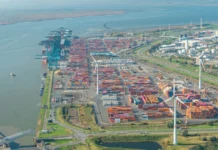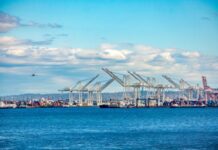
The following article was written by Matan Peled, Co-founder & Head of US Business at Windward.
Decades-long tensions between the West and several rogue players in the Middle East have entered a new chapter as Iran and its proxies continue to bring global disruptions to its new battleground – the high seas.
While nominally a regional conflict, ongoing trade disruptions in the Red Sea at the hands of Iran-backed Houthi Rebels have a global impact. This conflict is aimed at shifting world trade dynamics, and the cost of battle is inevitably economic.
Due to the delicate, interconnected nature of the maritime supply chain, any regional events that affect shipping lanes can rapidly evolve into issues of global concern, with the potential to disrupt delicate trade ecosystems and catalyze a chain reaction of complications.
If Houthi attacks continue, the supply chain disruptions and resultant price increases we’ve already seen are likely to become the norm – and stakeholders need to be prepared.
Maritime Trade Routes as a Battleground
Since November 2023, the Houthis – a Yemeni minority of Iranian-funded Shia extremists – have been attacking vessels in the Red Sea with ties to the West. What makes their actions so dire is that maritime shipping accounts for 90% of trade around the world – and with its access to the Suez Canal, the Red Sea is one of the world’s most critical trade corridors. Disruptions there inevitably lead to rising insurance costs, transit times, shipping prices, and supply chain uncertainty.
According to data provided by Windward, overall traffic in the Red Sea by the six major carriers decreased by 52% in Q1 2024, compared to Q4 2023, while the price of shipping containers from East Asia to North Europe increased 243% from December 2023 to January 2024.
Additionally, the seizure of the MSC Aries, a container ship near the Strait of Hormuz by Iranian forces points to yet another compromised maritime route. A week prior to that event, there was a 450% increase in destination updates in the Arabian Gulf by vessels intent on avoiding potential threats in the area. While the impacts of the seizure were relatively short lived, if the threat persisted, another vital shipping lane for vessels coming from the Persian Gulf would have been severely impacted–triggering yet another disruption to the maritime supply chain.
Emboldened by the disruptive success of their interference, the Houthis have now expanded their activities to the Arabian Sea and the Indian Ocean, claiming responsibility for attacks as far as 300 nautical miles from the Horn of Africa, including the April 26th attack on the MSC Orion.
Who Pays the Price?
The Suez Canal brought US$9.4 billion in revenue to Egypt in 2023, more than 2% of its GDP– if Houthi disruptions in the region persist, this figure could be cut in half, striking a massive blow to Egypt’s economy.
Jordan’s only port, Aqaba, completely relies on Red Sea trading routes. Without Red Sea access, Aqaba-bound ships must be rerouted around Africa’s Cape of Good Hope, across the Mediterranean, through the Suez Canal, and cautiously across the northern part of the Red Sea where Houthi presence is minimal.
Compared to the quarter prior, Q1 2024 saw a 67% and 50% decrease in the monthly average of container and tanker vessels respectively passing through the Bab-al-Mandeb strait – where the Arabian Sea meets the Red Sea – due to Houthi threats. The result was 134% and 70% increases in the monthly average of voyages through the Cape of Good Hope by container and tanker vessels within the same period.
Rerouting around Africa extends voyages to Europe and certain parts of the Middle East by 10-14 days and increases operational costs by about US$1 million per vessel. These costs raise freight rates or cause companies to opt for the more expensive air freight option, raising their operational costs which will trickle down to consumers.
The biggest victims will inevitably be the average consumer. In early May, Maersk announced that the expansion of Houthi attacks is causing more delays and even higher costs. And when profit margins go down for an extended period, these costs get passed down the supply chain, from the shipping companies to their customers who then raise the costs of their products.
Israel, whom the Houthis blame for their actions, has felt a similar impact to that of Southeast Europe with vessels having to take the same route around the Cape of Good Hope and through the Mediterranean Sea. But when looking it at comparatively, the impact on Israel is less than that on Egypt, Jordan, and other neighboring Arab countries, it begs the question – are the Houthi attacks really intended to target Israel and Israel alone
Rising Tensions Rock All Ships
As the tides of geopolitical tension swell on the high seas, the maritime domain has transformed into a critical battleground with profound implications for the world economy. And with the Houthis continuing to destabilize global supply chains, it is ultimately Iran, their proxies, and their other allies who stand to gain as they continue to damage Western trade economies weakened by the rising cost and time of shipping.
From increased security measures to rerouted vessels to rising costs, each disruption in the maritime trading ecosystem, however localized it may seem, leads to delays, shortages, and financial losses that ripple across the globe.
Companies navigating these turbulent waters must embrace proactive strategies to effectively manage their supply chain processes amidst the ongoing storms and return the world economy to smoother sailing.




